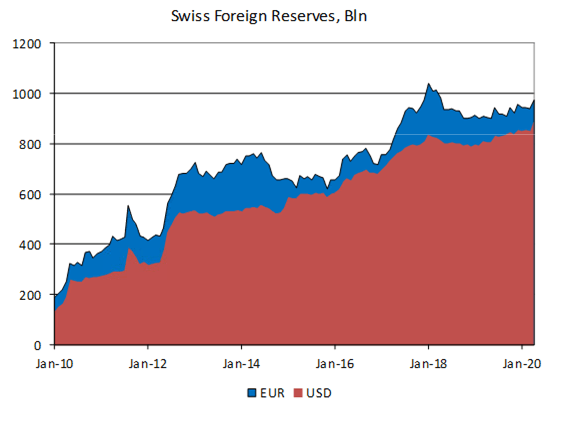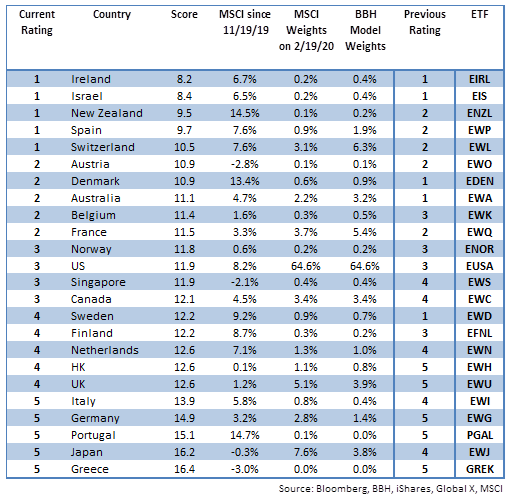There are some indexing events this week that could add to market volatility; the IMF will release updated global growth forecasts Wednesday The regional Fed manufacturing surveys for June will continue to roll out; Fed speaking engagements are somewhat limited this week Eurozone reports preliminary June PMI readings Tuesday; ECB releases its account of the June meeting Thursday All quiet on the Brexit front; UK reports preliminary June PMI readings Tuesday Japan reports preliminary June PMI readings Tuesday; the Antipodeans have a fairly quiet week; RBNZ meets Wednesday Risk assets came under some pressure last week as rising virus numbers and weak economic data outweighed the favorable liquidity backdrop. This week brings preliminary June PMI readings for much
Topics:
Win Thin considers the following as important: 5.) Brown Brothers Harriman, 5) Global Macro, Articles, developed markets, Featured, newsletter
This could be interesting, too:
Nachrichten Ticker - www.finanzen.ch writes Die Performance der Kryptowährungen in KW 9: Das hat sich bei Bitcoin, Ether & Co. getan
Nachrichten Ticker - www.finanzen.ch writes Wer verbirgt sich hinter der Ethereum-Technologie?
Martin Hartmann writes Eine Analyse nach den Lehren von Milton Friedman
Marc Chandler writes March 2025 Monthly
- There are some indexing events this week that could add to market volatility; the IMF will release updated global growth forecasts Wednesday
- The regional Fed manufacturing surveys for June will continue to roll out; Fed speaking engagements are somewhat limited this week
- Eurozone reports preliminary June PMI readings Tuesday; ECB releases its account of the June meeting Thursday
- All quiet on the Brexit front; UK reports preliminary June PMI readings Tuesday
- Japan reports preliminary June PMI readings Tuesday; the Antipodeans have a fairly quiet week; RBNZ meets Wednesday
![]() Risk assets came under some pressure last week as rising virus numbers and weak economic data outweighed the favorable liquidity backdrop. This week brings preliminary June PMI readings for much of the world, with further improvement from May expected. Some countries and states will continue to ease lockdowns this week, while Beijing struggles to contain an outbreak. The liquidity backdrop remains supportive for risk assets, but the tug of war between improved economic data and worsening virus numbers is likely to continue for the time being.
Risk assets came under some pressure last week as rising virus numbers and weak economic data outweighed the favorable liquidity backdrop. This week brings preliminary June PMI readings for much of the world, with further improvement from May expected. Some countries and states will continue to ease lockdowns this week, while Beijing struggles to contain an outbreak. The liquidity backdrop remains supportive for risk assets, but the tug of war between improved economic data and worsening virus numbers is likely to continue for the time being.
The dollar continues to edge higher, helped by risk-off sentiment despite improving US data. DXY traded Friday at the highest level since June 2 and has retraced nearly half of its May-June drop. Break of the 98.348 area is needed to set up a test of the May 25 high near 99.975. The euro remains heavy and traded at its weakest level since June 2. Sterling has fared worse, trading at its lowest level since June 1 and on track to test the May 25 low near $1.2160. Lastly, risk-off sentiment has seen USD/JPY trade back below 107.
There are some indexing events this week that could add to market volatility. MSCI announces the results of its 2020 Market Classification review Tuesday, with the focus on Iceland and Argentina. More importantly, the so-called Russell reconstitution will be announced after close of markets Friday, with new weightings to take effect the following Monday when markets reopen. This is an annual process that impacts the widely followed large-cap Russell 1000 and small-cap Russell 2000 indices, but the company notes that “the entire family of Russell US indexes will be recast to reflect changes in the US equity markets over the last year.”
The IMF will release updated global growth forecasts Wednesday. The agency has already signaled that its view will be downgraded again from its April global forecast of -3% contraction this year and 5.8% growth next year. We expect it will move closer to the OECD, which sees -6% global contraction this year and 5.2% growth next year.
AMERICAS
The regional Fed manufacturing surveys for June will continue to roll out. Richmond Fed reports Tuesday and is expected at -11 vs. -27 in May. Kansas City reports Thursday and is expected at -10 vs. -19 in May. Last week, the Philly Fed survey came in at +27.5 vs. -21.4 expected and -43.1 in May while the Empire survey came in at -0.2 vs. -29.6 expected and -48.5 in May. Markit preliminary June PMI readings will be reported Tuesday. Manufacturing is expected at 50.8 vs. 39.8 in May, while services is expected at 48.0 vs. 37.5 in May.
There are several other US data reports out this week. May Chicago Fed National Activity Index and existing home sale will be reported Monday. May new home sales (1.9% m/m expected) will be reported Tuesday. Thursday sees May advance goods trade, wholesale and retail inventories, and, durable goods orders. Another revision to Q1 GDP (seen steady at -5.0% SAAR) will also be reported Thursday. Personal income (-6.0% m/m expected) and spending (+8.8% m/m expected), and final June Michigan consumer sentiment (79.0 expected) will be reported Friday.
Fed speaking engagements are somewhat limited this week. Bullard speaks Tuesday, Bullard and Evens speak Wednesday, and Kaplan and Bostic speak Thursday. Last week, the Fed started its Main Street Lending Program and also started buying individual corporate bonds for the first time. Fed officials should expect many questions about these developments.
EUROPE/MIDDLE EAST/AFRICA
Eurozone reports preliminary June PMI readings Tuesday. Manufacturing is expected to improve to 44.8 from 39.4 in May, services is expected to improve to 41.2 from 30.5 in May, and composite is expected to improve to 42.0 from 31.9 in May. Both Germany and France are expected to show a similar trajectory of recovery. Final readings that include Italy and Spain will reported next month, with manufacturing July 1 followed by services and composite July 3.
ECB releases its account of the June meeting Thursday. At that meeting, the bank boosted its PEPP by EUR600 bln. It’s worth noting that comments from incoming German Judge Wallrabenstein suggest a possible thaw in relations between Germany’s top court and the European Court of Justice regarding ECB bond purchases. She noted that “What counts is an improved transparency of the decisions,” adding that it’s positive that the European Commission and Parliament are trying to take the lead on this matter. While most observers expect some sort of workable compromise to keep ECB QE going, these comments are nonetheless reassuring.
All quiet on the Brexit front. There are no talks scheduled this week ahead of the “intensified timetable” for Brexit negotiations in which five rounds of weekly talks will start the week of June 29.
UK reports preliminary June PMI readings Tuesday. Manufacturing is expected to improve to 45.0 from 40.7 in May, services is expected to improve to 39.0 from 29.0 in May, and composite is expected to improve to 41.0 from 30.0 in May. Reports suggest Chancellor Sunak is considering an emergency cut to the VAT to help boost the economy. He has asked officials to prepare various options for a cut.
ASIA
Japan reports preliminary June PMI readings Tuesday. May department store sales will also be reported Tuesday. June Tokyo CPI will be reported Friday and is expected to show further disinflation. Last week, the Cabinet Office upgraded its economic assessment slightly, noting that the economy remains in “an extremely severe situation” but has “almost stopped deteriorating.” It added that businesses see signs of an improving situation, and private consumption is “showing movements of picking up,” This was the first upgrade in its monthly assessment since January 2018.
The Antipodeans have a fairly quiet week. Australia reports preliminary June PMI readings Tuesday Preliminary May trade data will also be reported Tuesday. For now, the RBA is clearly on hold but its fairly upbeat outlook will surely be tested in the coming months. Elsewhere, the RBNZ meets Wednesday and is expected to keep rate steady at 0.25%. Here too, the bank is clearly on hold for now. May trade data will be reported Thursday.
Tags: Articles,developed markets,Featured,newsletter





